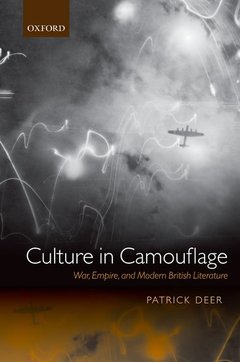Culture in Camouflage War, Empire, and Modern British Literature
Langue : Anglais
Auteur : Deer Patrick

Culture in Camouflage aims to remap the history of British war culture by insisting on the centrality and importance of the literature of the Second World War. The book offers the first comprehensive account of the emergence of modern war culture, arguing that its exceptional forms and temporalities force us to reappraise British cultural modernity. The book explores how writers like Ford Madox Ford, Siegfried Sassoon, Wilfred Owen, T.E. Lawrence, Winston Churchill, Elizabeth Bowen, Virginia Woolf, James Hanley, Rex Warner, Alexander Baron, Keith Douglas, Henry Green, and Graham Greene contested the dominant narratives of war projected by an enormously powerful and persuasive mass media and culture industry. Patrick Deer reads war literature as one element in an expanded cultural field, which also includes popular culture and mass communications, the productions of war planners and military historians, projections of new technologies of violence, the fantasies and theories of strategists, and the material culture of total war. Modern war cultures, Deer contends, are defined by their drive to normalize conflict and war-making, by their struggle to colonize the entire wartime cultural field, and by their claim to monopolize representations and interpretation of the conflict. But the mobilization of cultural formations during wartime reveals, at times glaringly, the constitutive contradictions at the heart of modern ideas of culture. The Great War failed to produce a popular war culture on the home front, producing instead an extraordinary literature of protest, yet the strategists struggled to regain their oversight over both the enemy across no man's land, and the minds and bodies of their own mass conscript armies. The interwar years saw a massive effort to make strategic fantasies a reality; if the technology of imperial air power or mobile armoured warfare did not yet exist, culture could be mobilized to shore up the ramshackle war machine. During World War Two a fully fledged British war culture emerged triumphant in time of national crisis, offering the vision of a fully mobilized island fortress, a loyal empire, and a modernized war machine ready to wage a futuristic war of space and movement. This was the struggle that British World War Two writers confronted with extraordinary courage and creativity.
Introduction. 1. From the panorama of battle to the labyrinth of total war: British war writing, 1914-1929. 2. The Empire of the Air: British Air Power and the Second World War. 3. Culture in the Blackout: Living Through the Blitz, 1940-44. 4. Ghosts inside the 'island fortress': Graham Greene, Elizabeth Bowen, and the Haunting of the Home Front. 5. 'When in a year collapse particular memories': the battle over culture and memory in Second World War writing. Conclusion. The Boom Ends: The war on the British literature of the 1940s. Bibliography.
Patrick Deer teaches in the English Department at New York University. His teaching interests include 20th-century British literature, war culture, modernism, postcolonial literature and theory, Anglophone literature, cultural studies, the novel and film, critical theory, and gender studies. He is Guest Editor of 'The Ends of War', a Special Issue of Social Text (2007) vol. 25.2., and Co-Editor, with Gyan Prakash and Ella Shohat, of 'Reflections on the Work of Edward Said: Special Issue', Social Text 87 (2006) vol. 24.2. His published work also includes, 'The Dogs of War: Myths of British Anti-Americanism', in AntiAmericanism, edited by Andrew Ross and Kristin Ross (New York University Press, 2004), and 'Defusing the English Patient', an essay on the film adaptation of Michael Ondaatje's novel commissioned for A Companion to Literature and Film, edited Robert Stam (Basil Blackwell, 2004).
an exciting book, full of good analyses of individual texts rld War II
Date de parution : 11-2015
Ouvrage de 348 p.
15.5x23.2 cm
Date de parution : 03-2009
Ouvrage de 342 p.
16.3x24.1 cm
Thème de Culture in Camouflage :
© 2024 LAVOISIER S.A.S.


